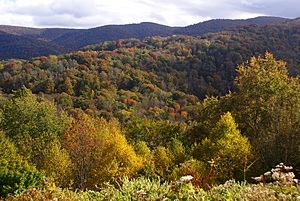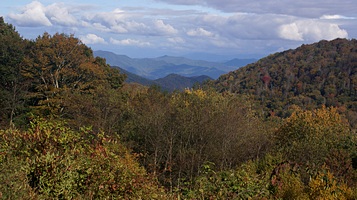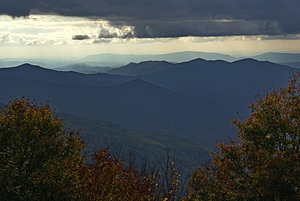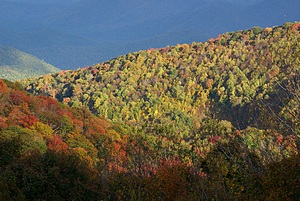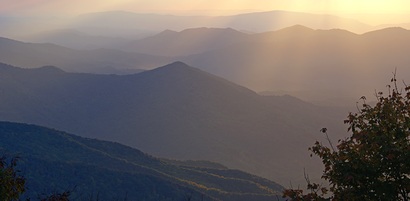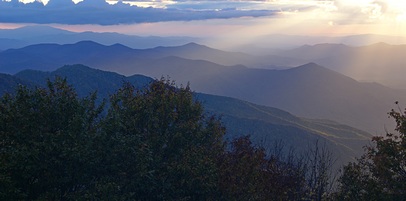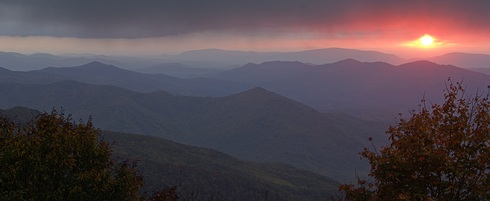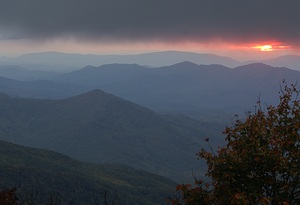Madeline was awake before 7 AM and coughing loose a bit of nasal/chest congestion. A little after 7 Linda put on her robe and went to check on her. I put my robe on too and Linda brought her to bed with us. She lay quietly between us for a half hour, as dawn gradually illuminated the outside world, but never fell back asleep. I needed to change position and offered to hold her on the sofa in the living room, which she accepted. I turned on the fireplace and she climbed up in my lap and snuggled up. Linda joined us a little while later and the three of us cuddled in the dancing light and warmth of the fire for another 20 minutes. These are the special moments.
Madeline wanted to see the last part of the Curious George video we watched last night so Linda did video duty while I made a pot of coffee. By the time the cartoon was done Madeline was awake enough to help make breakfast; vegan pancakes with blueberries incorporated into the batter. Madeline helped mix all of the ingredients but Linda handled the cooking. Madeline is only 34 months old after all, and not ready to work with sharp objects or heat. We had hot real maple syrup and mixed berries on the side with orange juice (not from concentrate).
The whole morning was accomplished in our robes and pajamas and it felt like it was Sunday. Madeline even got to see a half dozen very large wild turkeys in the street in front of our house. The cats seem to know when Madeline is seated at the table and often emerge long enough to get a few kibbles and a drink of water. Madeline got some berry stains on her pajamas so Linda got her undressed to get them out. Madeline took that as an opportunity to enjoy the freedom of running around in her birthday suit for a few minutes. You can get away with that when you are not yet three years old.
Everyone got dressed and then took up their stations in the living room. Linda and Madeline played with Legos and played (with) the organ. Ms. M and I then played “soccer,” throwing, catching, and kicking a large beach type ball and a small soccer type ball. Madeline was still a little tired so Linda sat with her while she played an iPad game that involved taking care of a dog.
Yesterday the UPS truck delivered a package from B&H Photo in New York. Inside was a Sony alpha 99 camera body, specifically an SLT-A99V, which included an infoLithium (Lithium ion) battery and charger, a camera strap, a hot shoe flash adapter, Getting Started instructions, a CD-ROM with software and manuals, and various pieces of paper that included warranties and special offers. Also in the box was a vertical battery grip (VG-C99AM), five additional infoLithium batteries, a belt-mount battery holder, and two 64 GB SDXC memory cards.
Linda suggested that this was my Christmas and birthday present for the next five years, but the reality is that the old Sony alpha 100 body was an increasingly unsatisfactory camera and needed to be replaced. I bought the a100 in 2007 or 2008 and have not spent hardly any money on photographic equipment since then. The a99 has been around for a few years now but is still Sony’s top-of-the-line full-frame (36mm x 24mm) sensor, A-mount lens body, which means it is compatible with all of my old existing A-mount Minolta lenses. As it turns out, I can also use A-mount lenses designed for smaller sensors, such as the lens that came with the a100. The a99 detects the lens format and adjusts the use of the sensor accordingly. The a100 zoom lens, however, was an inexpensive “kit” lens that turned out not to be very sharp, especially around the edges, so it is unlikely that I will ever use it with the a99.
At 24 MP (mega pixels) the a99v is not a state-of-the-art camera by comparison to the newest offerings from Canon and Nikon, or even Sony’s own E-mount product line, but it is double the pixel count of the 12 MP a100, and has many features that the a100 does not have, including much better auto-focus and much better sensitivity to low light. The maximum effective ISO speed on the a100 is 1600 whereas the a99v is 25600 and can be set even higher if needed. The a99v also includes a built-in GPS receiver that enables it to geotag images. It includes a hot shoe flash adapter, as well as a PC flash connection, so I have some hope that I will be able to use my old flash equipment, something I have not been able to do with my much older Sony alpha 100.
The old a100 holds one Lithium ion battery and one Compact Flash card, 4 GB maximum. It also has an adapter so it can use SD memory cards, but the maximum usable capacity is still 4 GB. The a99v also holds one Lithium ion battery in the camera body but holds two additional batteries in the vertical grip accessory. Not only will the vertical grip be handy for shooting in portrait orientation, the two additional batteries should allow for extended shooting time even when using flash. The body also has two memory card slots both of which can accept SD memory cards up to 64 GB. Slot one can also accept a Sony Memory Stick Pro Duo.
Digital cameras are sophisticated combinations of mechanical, optical, electronic, and computer technologies. Compared to film cameras of yesteryear prosumer and professional cameras, both single lens reflex (SLR) and single lens translucent (SLT) like the a99v, are feature-rich devices designed to give photographers complete control of the images that are produced. That also means they are complicated devices with significant learning curves. Throw in the fact that cameras like the a99v can shoot HD movies with sound and it takes considerable practice over an extended period of time to really master their use. But I am retired, and photography is one of my three hobbies, so I have, and will take, the time to learn to use this new camera competently. Competence in this case means the ability to quickly and intuitively select modes and adjust settings to allow me to capture (create) the images I envision.
Brendan called to see how Madeline was doing and arranged to pick up her up later in the afternoon, after the 3:30 PM start time of the U of M football game. Unless you are attending the game you do not want to drive in, or anywhere near, Ann Arbor for the four or five hours preceding the opening kickoff. It’s not a great place to be after the game ends either, especially as regards getting in to a restaurant or pub, unless you specifically want to be part of the pre/post game experience.
Madeline wanted to go outside and swing so we put on our shoes and got her into a light jacket. She is just learning to pump her feet. She understands the concept but does not yet having the timing. When she was done with the swing we collected branches and twigs that were lying in the yard and added them to the burn pile. We then walked around part of the back yard but her shoes got wet from the grass and she wanted to go back inside.
I checked our apple tree and was surprised to see damage that looked similar to that caused by the Emerald Ash Borer. It’s possible that deer have been chewing at the bark but whatever the cause there are some very large limbs that are now dead. What concerned me is that I do not recall them being in that condition the last time I looked. The tree is very old, very large, and has not been properly pruned for a very long time. We may end up losing it in the end, which would be a shame, but the time to prune is late winter to very early spring and we have not been here at that time of year the last two seasons. I have my eye on a portion of the western 2/3rds of our yard, however, as prime real estate for some new trees, including some fruit trees. But not this year, and probably not next year either.
Madeline was hungry after her backyard adventure. She had soy yogurt and pistachios for lunch and found the pistachios very much to her liking. She and Linda watched a Daniel Stripped Tiger cartoon and then she laid down for a nap at 1:30 PM. I snuck off to my office to check e-mail, install the software that came with my new camera, and start downloading updates for the Linux box. Completing the installation of the Sony Play Memories Home software required the camera to be connected to the computer, so I installed the two SDXC memory cards and one of the fully charged batteries. On first power up I had to set the date and time. I then connected it to the computer with the provided USB cable and completed the software installation.
One of the things the PMH software does is go through the PICTURES folder and catalog all of the images it finds by date and makes them accessible through a calendar view. The camera also came with the Image Data Converter program for dealing with RAW format image files and Remote Control software that allows the camera to be tethered to a computer and controlled from there. I will eventually have to figure out if/how Adobe Lightroom and Photoshop deal with Sony RAW files.
I quit working at 3 PM, Linda got Madeline up at 3:30, and Brendan arrived at 3:35. Madeline had been sleeping pretty soundly and did not wake up easily. She was initially upset that her mom did not come with her dad to get her and got herself worked up enough that she took quite a while to settle down. To make matters worse she really wanted to stay another night at our house and was resisting going home even though she wanted to see her mommy. When you are not yet 3 years of age it’s hard to understand that you cannot have mutually contradictory things at the same time, although I suppose in this case that had Shawna come to the house and stayed overnight Madeline could have had everything she wanted.
Linda got Madeline’s toddler bed deflated and packed for travel and rolled up her sleeping bag. She and Brendan then gathered up all of the things that had to go back to Ann Arbor. Madeline does not travel light; the clothes, books, toys, stuffed animals, and other accoutrements filled four carry bags in addition to the bed and sleeping bag.
After Brendan and Madeline left I checked my e-mail and replied to several having to do with my duties as secretary of the FMCA Freethinkers Associate Chapter. We will be holding our annual meeting by teleconference in the next three to six weeks and I have to update the roster and prepare financial statements.
I transferred the complete User’s Manual for the Sony a99v from the CD-ROM to my laptop, backed it up to the NAS units, and then e-mailed it to my iPad. I downloaded it to my iPad and spent much of the evening reading it. We headed off to bed a little after 9 PM. I tuned into the Create channel on Detroit PBS (WTVS) and watched a series of back-to-back episodes of Cooking with Nick Stellino while I worked on this post. Nick’s show is charming and he is the poster boy for unapologetic high self-esteem but with no hint of arrogance. His love of food and passion for cooking is infectious and I enjoy his show.
